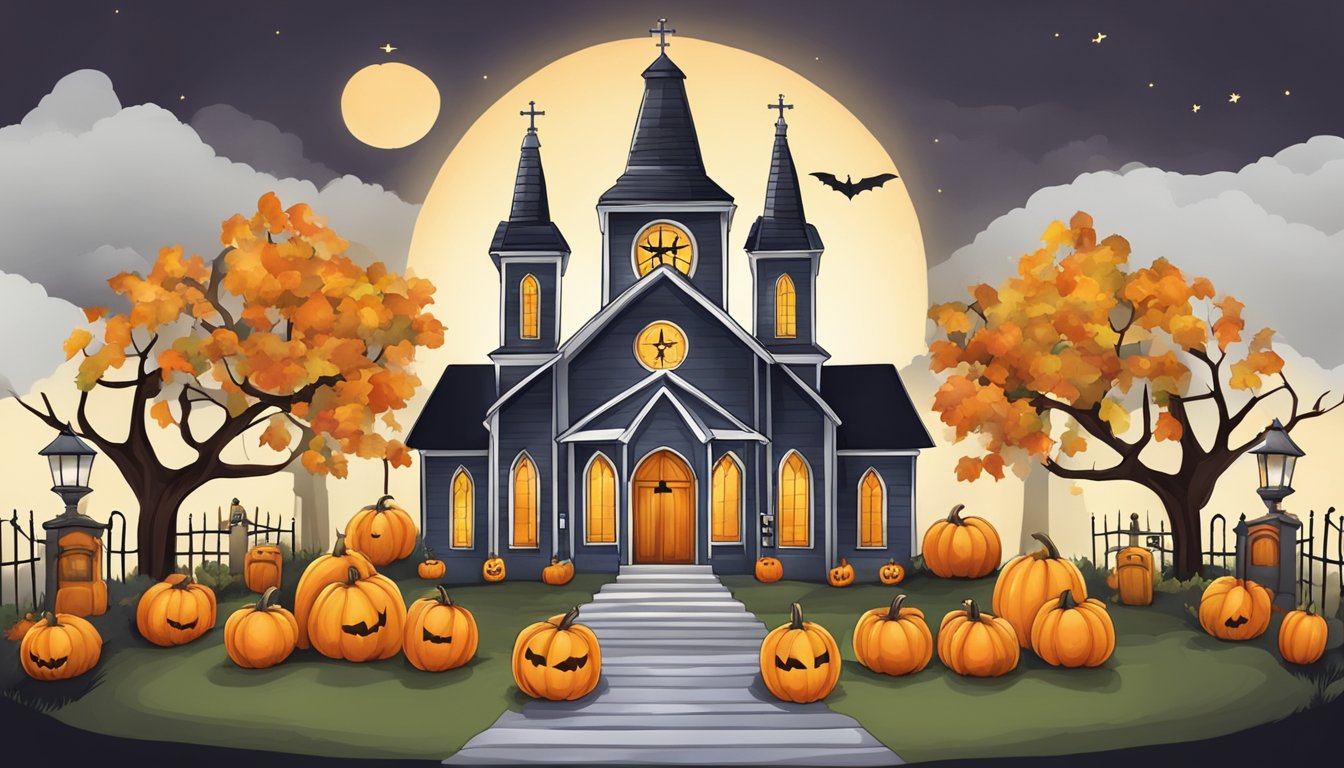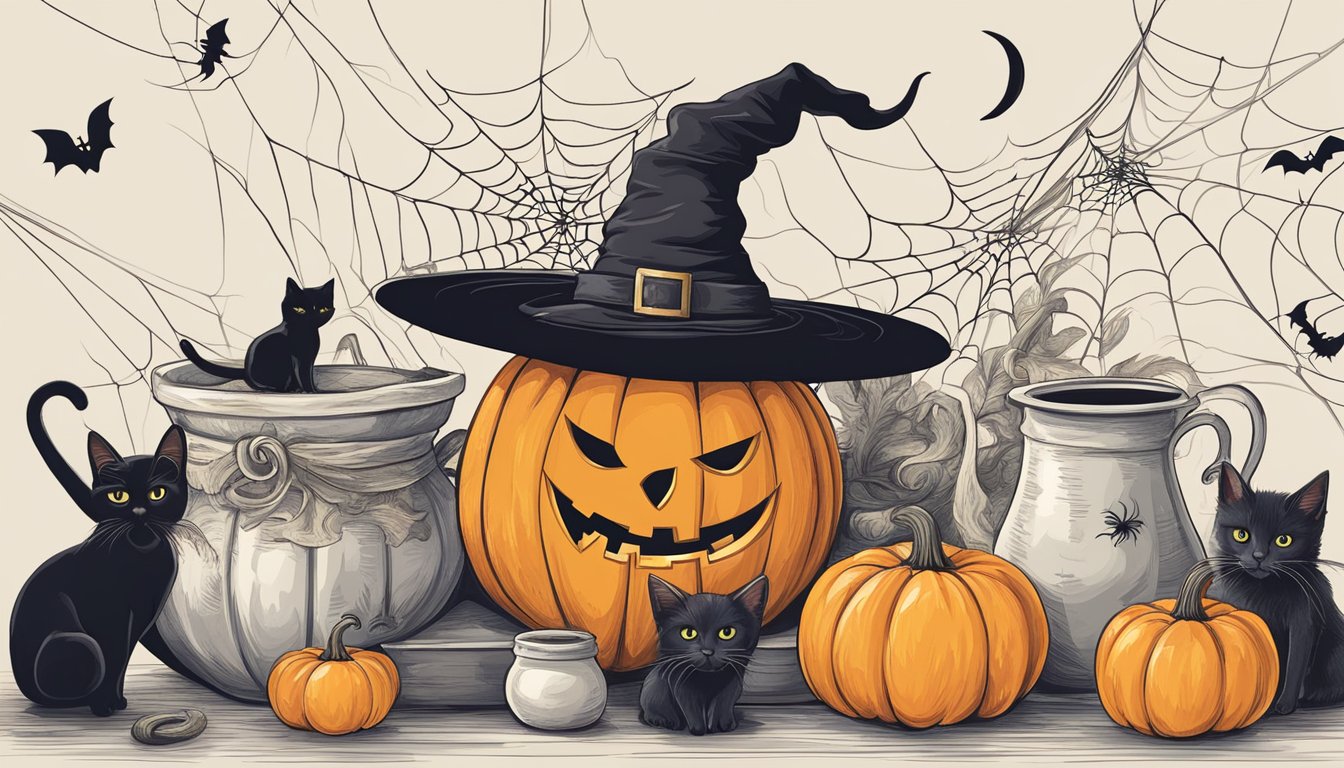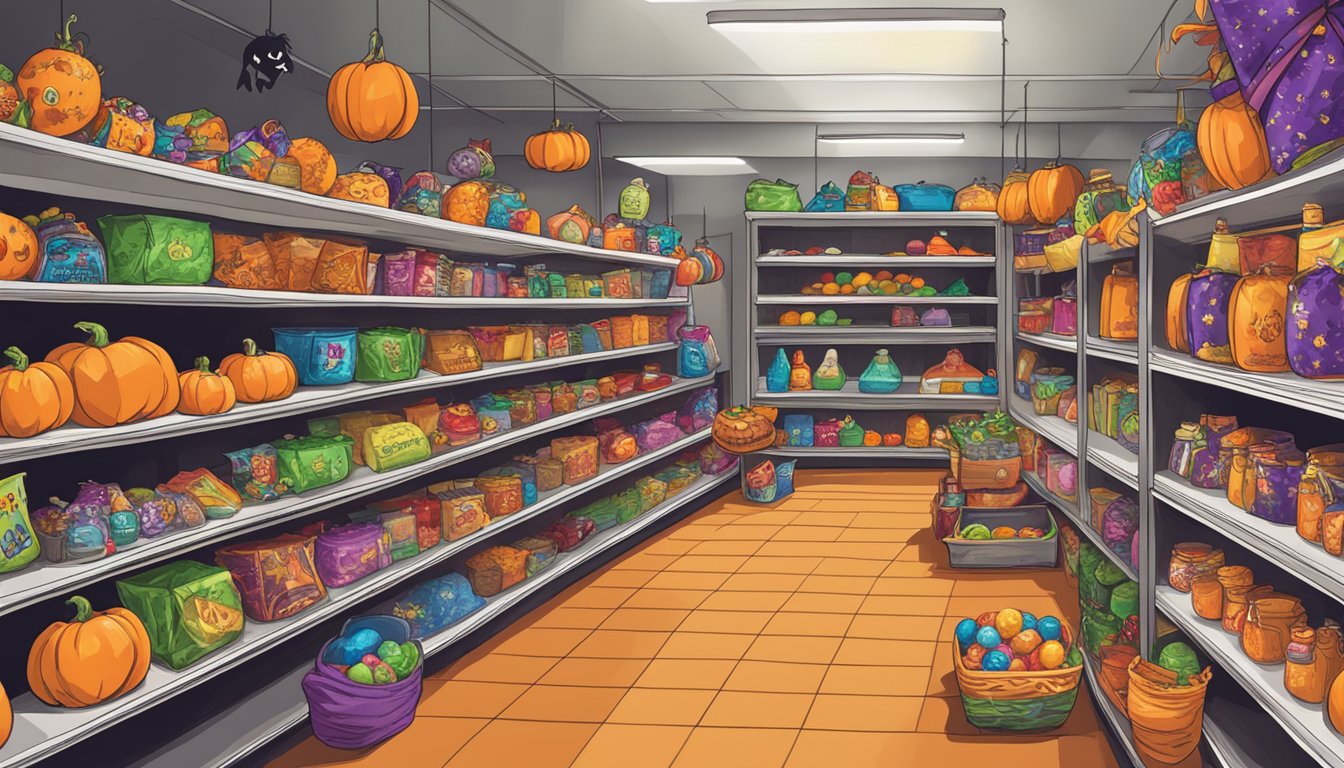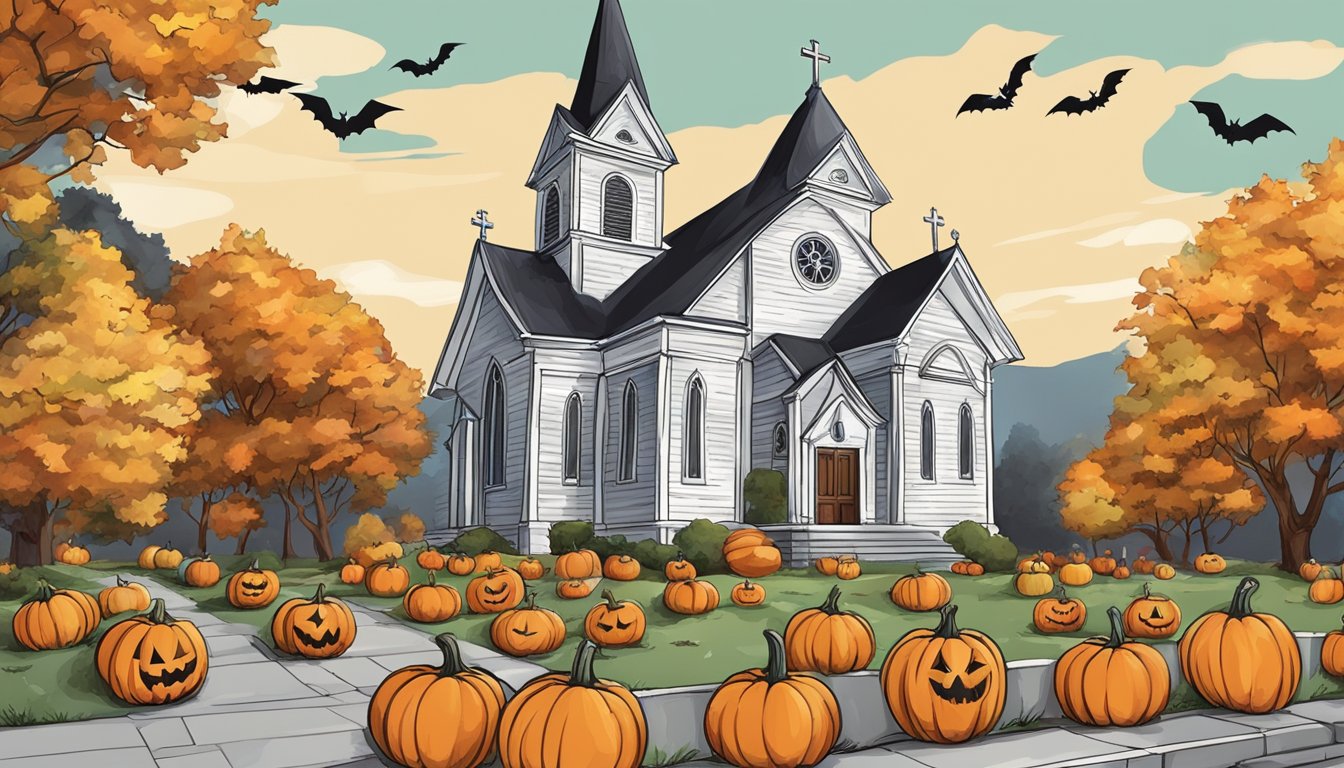Halloween is a holiday that has been celebrated for centuries, but its origins and meaning have been the subject of debates and controversies. Some people believe that Halloween is a Christian holiday, while others argue that it has pagan roots and is not compatible with Christian beliefs. This article explores the question of whether Halloween is a Christian holiday and provides insights into its history, traditions, and cultural significance.

The origins of Halloween can be traced back to ancient Celtic harvest festivals, such as Samhain, which marked the end of the harvest season and the beginning of winter. Over time, Halloween evolved into a secular holiday that is associated with costumes, candy, and spooky decorations. However, many people still associate Halloween with its pagan roots and view it as incompatible with Christian beliefs.
Despite its pagan origins, Halloween has also been influenced by Christian practices and beliefs. For example, the name “Halloween” is derived from “All Hallows’ Eve,” which is the evening before All Saints’ Day, a Christian holiday that celebrates the lives of the saints. Some Christian communities have embraced Halloween as an opportunity to celebrate their faith and connect with their neighbors, while others have rejected it as a pagan holiday that promotes evil and darkness.
Key Takeaways
- Halloween has pagan roots but has been influenced by Christian practices and beliefs.
- Some Christian communities embrace Halloween as an opportunity to celebrate their faith and connect with their neighbors, while others reject it as a pagan holiday that promotes evil and darkness.
- The question of whether Halloween is a Christian holiday remains a subject of debates and controversies.
Origins of Halloween

https://www.youtube.com/watch?v=UyOqOa440l4&embed=true
Halloween is an annual celebration that is observed on October 31st. It has been celebrated for centuries and has evolved over time. The origins of Halloween can be traced back to ancient Celtic roots, which were then influenced by Christian traditions. In this section, we will explore the history of Halloween and its evolution over time.
Ancient Celtic Roots
Halloween has its roots in the ancient Celtic festival of Samhain. Samhain was a harvest festival that marked the end of the Celtic year and the beginning of winter. The festival was celebrated on the night of October 31st, and it was believed that on this night, the spirits of the dead would return to the world of the living.
Samhain and Harvest Festivals
The Celts believed that during Samhain, the veil between the worlds of the living and the dead was at its thinnest. They would light bonfires and wear costumes to ward off evil spirits. The festival also included feasting and the exchanging of gifts. With the arrival of Christian missionaries, the Samhain festival was gradually replaced by All Saints’ Day, which was celebrated on November 1st.
Christian Influence and All Saints’ Day
In the 8th century, Pope Gregory III designated November 1st as a day to honor all saints and martyrs. This day was known as All Saints’ Day, or All Hallows’ Day. The night before All Saints’ Day became known as All Hallows’ Eve, which eventually became Halloween.
Over time, Halloween became a secular holiday that was celebrated with costumes, parties, and trick-or-treating. However, many Christian traditions are still associated with Halloween, such as lighting candles in remembrance of the dead.
In conclusion, Halloween has evolved over time from its ancient Celtic roots to a secular holiday that is celebrated around the world. While it is no longer a religious holiday, it still has Christian influences and traditions.
Halloween and Christianity
https://www.youtube.com/watch?v=llzm3RADaRk&embed=true
Halloween, also known as All Hallows’ Eve, is a holiday celebrated on October 31st, the eve of the Western Christian feast of All Hallows’ Day or All Saints’ Day. While Halloween has become a secular holiday that is widely celebrated in many countries, its origins are rooted in Christianity.
The Church’s Stance on Halloween
The Catholic Church has historically celebrated All Saints’ Day on November 1st and All Souls’ Day on November 2nd to honor the martyrs and believers who have died. However, the origins of Halloween can be traced back to the ancient Celtic festival of Samhain, which was celebrated on the night of October 31st to mark the end of the harvest season and the beginning of winter.

Pope Gregory III designated November 1st as a time to honor all saints and martyrs, and the night before became known as All Hallows’ Eve, which eventually became Halloween. The church attempted to replace the pagan festival with a Christian one, but many of the traditions associated with Halloween, such as dressing up in costumes and carving pumpkins, have pagan roots.
Biblical Perspectives on Halloween
While the Bible does not directly address Halloween, some Christians view it as a celebration of evil spirits and therefore incompatible with their faith. Deuteronomy 18:10-12 warns against divination, sorcery, and witchcraft, which some Christians interpret as a condemnation of Halloween.
However, others argue that Halloween can be celebrated in a way that is consistent with the Christian faith. Ephesians 5:7-15 encourages believers to live as children of light and to expose the deeds of darkness. Some Christians see Halloween as an opportunity to share the gospel and to shine the light of Christ in a dark world.
Modern Christian Observance
Today, the observance of Halloween varies among Christian denominations. The Orthodox Church celebrates the feast day of All Saints on the first Sunday after Pentecost, while some Protestant churches do not observe Halloween at all.
Overall, the question of whether Christians should celebrate Halloween is a matter of personal conviction and interpretation of scripture. While some Christians choose to avoid Halloween altogether, others see it as an opportunity to engage with their communities and to share the love of Christ.
The Evolution of Halloween Traditions
https://www.youtube.com/watch?v=sd_dusRGAKM&embed=true
« Is Jehovah Witness a Christian? Exploring the Beliefs and Practices of Jehovah’s Witnesses
Is Baptist a Christian? Exploring the Relationship Between Baptist Beliefs and Christianity »
Halloween is a holiday that has evolved over centuries and has been influenced by various cultures and traditions. In this section, we will explore the history of Halloween and how it has transformed into the holiday we celebrate today.
From Pagan Rituals to Secular Celebrations
The origins of Halloween can be traced back to the ancient Celtic festival of Samhain, which was celebrated on the night of October 31st. The Celts believed that on this night, the veil between the world of the living and the dead was at its thinnest, allowing spirits to cross over into the world of the living. To ward off these spirits, the Celts would light bonfires, wear costumes, and make offerings of food and drink.
As Christianity spread throughout Europe, the Catholic Church sought to replace pagan practices with Christian ones. In the 8th century, Pope Gregory III declared November 1st as All Saints’ Day, a day to honor all Christian saints and martyrs. The night before All Saints’ Day became known as All Hallows’ Eve, which eventually became Halloween.
Over time, Halloween became less of a religious holiday and more of a secular celebration. The practice of dressing up in costumes and going door-to-door for treats, or “trick-or-treating,” became popular in the United States in the early 20th century.
The Influence of Irish Immigrants in America

Irish immigrants brought their Halloween traditions to America in the 1800s, including the carving of pumpkins, which replaced the traditional Irish practice of carving turnips. The Irish also brought the tradition of “guising,” in which children would go door-to-door in costumes and perform a song or dance in exchange for food or money.
In the United States, Halloween became a popular holiday in the 20th century, with the rise of consumer culture and pop culture. Today, Halloween is celebrated with costumes, candy, haunted houses, and other spooky traditions.
In conclusion, Halloween has come a long way from its pagan roots to become a secular holiday celebrated by people of all ages. While some of its traditions may have originated from pagan practices or Catholic traditions, Halloween has evolved into a holiday that is enjoyed by many for its playful and spooky nature.
Cultural Significance of Halloween Symbols
Halloween is a holiday with many symbols that are deeply ingrained in popular culture. These symbols have a rich history and cultural significance that have evolved over time. In this section, we will explore the cultural significance of some of the most iconic Halloween symbols.
Jack-O’-Lanterns and Their Lore

One of the most recognizable symbols of Halloween is the Jack-O’-Lantern. These carved pumpkins have become a staple of Halloween decorations, but their origins are steeped in folklore. According to Irish legend, a man named Stingy Jack tricked the devil and was subsequently denied entry into both heaven and hell after he died. He was forced to wander the earth with only a carved-out turnip to light his way. The Irish began to carve scary faces into turnips to ward off evil spirits, and when they immigrated to America, they found that pumpkins were a more abundant and easier to carve alternative.
Costumes and Identity Play
Halloween costumes are another iconic symbol of the holiday. Dressing up in costumes allows people to take on a new identity for a night, which can be liberating and fun. Halloween costumes can range from the scary to the silly, and often reflect pop culture trends or classic horror movie monsters. The tradition of wearing costumes on Halloween dates back to the medieval period, when people would dress up as saints, angels, and demons as part of All Saints’ Day celebrations.
Candy and Trick-or-Treating
Trick-or-treating is a popular Halloween tradition that involves children going door-to-door in costume and asking for candy. The tradition of trick-or-treating has its roots in the medieval practice of souling, where poor people would go door-to-door asking for food in exchange for prayers for the dead. In America, the tradition of trick-or-treating became popular in the 1930s, and has since become a hallmark of Halloween celebrations. The candy that is given out on Halloween also has cultural significance. In the past, it was common to give out soul cakes, a type of sweet bread that was believed to help the souls of the dead reach heaven. Today, candy is the most common treat given out on Halloween, and has become a symbol of the holiday.
In conclusion, the symbols of Halloween have a rich cultural significance that has evolved over time. From the origins of the Jack-O’-Lantern to the modern tradition of trick-or-treating, Halloween is a holiday that is steeped in tradition and folklore.
Halloween Around the World
https://www.youtube.com/watch?v=TGiEW6dQTac&embed=true
Diverse Celebrations Across Continents

Halloween has become a global phenomenon, and it’s celebrated in many different ways across the world. While the holiday originated in Western Europe, it has taken on a life of its own in many different cultures.
In the United States, Halloween has become one of the most popular holidays of the year. Americans celebrate the holiday by dressing up in costumes, carving pumpkins, and going trick-or-treating. Many cities and towns also host Halloween parades and festivals.
In Ireland, where Halloween originated, the holiday is known as Samhain. It is still celebrated today with traditional customs like bonfires and apple bobbing. In Scotland, Halloween is celebrated with a festival called Samhuinn, which features a torchlight procession and street theater.
In Brittany, France, Halloween is celebrated with a traditional feast called Kig Ha Farz, which includes a savory pudding made with pork and vegetables. In Cornwall, England, the holiday is known as Allantide, and it is celebrated with the giving of gifts and the eating of special cakes.
The Isle of Man, located in the Irish Sea, has its own unique Halloween traditions. One of the most popular is the lighting of bonfires on the hillsides, which is said to ward off evil spirits. In Wales, Halloween is known as Nos Calan Gaeaf, and it is celebrated with traditional foods like soul cakes and roasted apples.
Halloween’s Reach Beyond the Western World

Halloween has also become popular in many other parts of the world, including Asia and Latin America. In Japan, Halloween is celebrated with costume parties and parades, while in Mexico, the holiday is known as Dia de los Muertos, or Day of the Dead, and it is celebrated with colorful altars and offerings to deceased loved ones.
In China, Halloween is known as Teng Chieh, and it is celebrated with the lighting of lanterns and the offering of food to ancestors. In Korea, the holiday is known as Chusok, and it is celebrated with the making of special rice cakes and the visiting of family graves.
Overall, Halloween has become a global celebration that is enjoyed by people of all ages and backgrounds. Whether you’re in the United States or on the other side of the world, there’s a good chance that you’ll find a Halloween celebration that’s right for you.
The Commercialization of Halloween
Halloween has become one of the most commercialized holidays in the United States. It is no longer just a day for children to dress up in costumes and go trick-or-treating for candy. The holiday has now become a major industry, with millions of dollars spent on costumes, decorations, and candy every year.
The Halloween Industry

The Halloween industry is worth billions of dollars. According to the National Retail Federation, Americans spent over $9 billion on Halloween in 2021, with the average American spending about $102 on Halloween-related items. The majority of this spending is on costumes, followed by decorations and candy.
The rise of the Halloween industry has led to the creation of many jobs, from costume designers to candy makers. It has also led to the growth of many small businesses, such as Halloween stores and pumpkin patches.
Media and Entertainment
The commercialization of Halloween is not just limited to the sale of costumes and candy. It has also become a major part of pop culture and media. Halloween-themed movies and TV shows are aired every year, and celebrities often dress up in elaborate costumes for Halloween parties.
The media and entertainment industry has also contributed to the growth of the Halloween industry. Many popular TV shows and movies have Halloween-themed episodes or sequels, which are often released around Halloween. This has led to the creation of many Halloween-themed products, such as toys and collectibles.
In conclusion, the commercialization of Halloween has transformed the holiday into a major industry, with billions of dollars spent on costumes, decorations, and candy every year. The rise of the Halloween industry has also led to the growth of many small businesses and has become a major part of pop culture and media.
Christian Alternatives to Halloween

https://www.youtube.com/watch?v=xvPSuz0JfNo&embed=true
Many Christians choose not to participate in Halloween due to its pagan origins and association with evil. However, there are several alternatives that Christians can participate in that align more closely with their faith. Here are two popular alternatives:
Church-Organized Events
Some churches choose to organize alternative events on Halloween night. These events may include games, music, and food, providing a safe and fun environment for families to celebrate. Bible-themed costumes can also be worn, providing an opportunity for children to learn about their faith while having fun.
Harvest Festivals and “JesusWeen”
Another popular alternative is to celebrate a Harvest Festival instead of Halloween. This involves celebrating the bounty of the fall harvest, with activities such as pumpkin carving and apple bobbing. Some Christians also celebrate “JesusWeen,” which involves handing out Bibles and other Christian literature instead of candy.
Overall, Christians have a variety of alternatives to Halloween that align more closely with their faith. These alternatives provide a way for families to celebrate the fall season in a safe and meaningful way, while also staying true to their beliefs.
Debates and Controversies

https://www.youtube.com/watch?v=MdMM2h_XXyI&embed=true
Halloween and Its Critics
Halloween has been a subject of debates and controversies for many years. Some Christians believe that Halloween is a pagan holiday that celebrates evil spirits and death. They argue that the Bible condemns such celebrations and that Christians should not participate in them. They also claim that Halloween is a gateway to sin and that it promotes fear and darkness.
However, others argue that Halloween has Christian roots and that it is a celebration of life and resurrection. They claim that Halloween is a time to remember the saints and martyrs who died for their faith and that it is a way to confront and overcome our fears.
Safety and Ethical Concerns
Apart from the religious debates, Halloween has also raised concerns about safety and ethics. Some people worry about the safety of children who go trick-or-treating and the risks of accidents, injuries, and illnesses. They also worry about the ethical implications of wearing costumes that stereotype and offend certain groups of people.
To address these concerns, many communities have implemented safety measures and guidelines to ensure a safe and enjoyable Halloween experience. They encourage parents to supervise their children and to inspect their candy for any signs of tampering or contamination. They also promote the use of non-offensive and culturally sensitive costumes and decorations.

In conclusion, Halloween is a holiday that has sparked many debates and controversies over the years. While some view it as a celebration of evil spirits and death, others see it as a celebration of life and resurrection. Regardless of one’s beliefs, it is important to observe safety measures and ethical considerations to ensure a safe and enjoyable Halloween experience for all.
Theological Reflections on Halloween
https://www.youtube.com/watch?v=cuNmrD0yljg&embed=true
Understanding Halloween Through Scripture
For many Christians, Halloween is a controversial holiday that raises questions about its compatibility with faith. Some argue that the holiday has pagan roots and promotes occult practices, while others see it as a harmless celebration of costumes and candy.
From a biblical perspective, Halloween is not explicitly mentioned in Scripture, but the themes of death and evil spirits are certainly present. The Bible warns against dabbling in the occult and practicing divination (Deuteronomy 18:10-12). It also acknowledges the reality of evil spirits and their influence on the world (Ephesians 6:12).
However, the Bible also teaches that believers have victory over evil through Christ (1 John 4:4) and that death has been conquered through his resurrection (1 Corinthians 15:55-57). Therefore, Christians can approach Halloween with confidence, knowing that they are protected by the power of God and can resist any temptation to engage in harmful practices.
The Role of Saints and Martyrs in Halloween
Halloween has its roots in the ancient Celtic festival of Samhain, which marked the end of the harvest season and the beginning of winter. It was believed that on this day, the veil between the living and the dead was thinnest, and spirits could cross over into the world of the living.
In the 8th century, Pope Gregory III designated November 1 as All Saints’ Day, a day to honor all the saints and martyrs of the church. This was followed by All Souls’ Day on November 2, which was a day to pray for the souls of the faithful departed.
Over time, these Christian observances merged with the pagan traditions of Halloween, creating a holiday that combines elements of both. Today, many Christians celebrate Halloween by dressing up as saints or biblical characters, emphasizing the victory of Christ over death and evil.
In the Orthodox Church, Halloween is celebrated as the eve of the feast day of All Saints, which falls on the first Sunday after Pentecost. This day is a reminder of the great cloud of witnesses who have gone before us and encourages us to persevere in faith.
Overall, Halloween can be a time for Christians to reflect on the reality of evil and death, but also to celebrate the victory of Christ and the hope of eternal life.
Conclusion
Embracing a Balanced View on Halloween
In conclusion, the question of whether Halloween is a Christian holiday is not a straightforward one. While the origins of Halloween can be traced back to pagan and mythical practices, the holiday has evolved over time and has taken on different meanings for different people. For some, Halloween is a time to celebrate their faith and to remember the saints and martyrs who have gone before them. For others, Halloween is a time to dress up in costumes, carve pumpkins, and eat candy.
As with many traditions, there are different perspectives on Halloween among Christians. Some Christians may choose not to participate in Halloween at all, while others may embrace the holiday as an opportunity to share their faith with others. Ultimately, the decision of how to approach Halloween is a personal one, and Christians should follow their conscience in choosing how to celebrate or not celebrate the holiday.
It is important to note that while Halloween may have pagan origins, it has also been embraced by many Christians as a way to celebrate their faith and to connect with their communities. As such, it is possible to embrace a balanced view of Halloween that acknowledges the holiday’s origins while also celebrating its positive aspects.
Overall, the question of whether Halloween is a Christian holiday is less important than the question of how Christians choose to approach the holiday. By embracing a balanced view of Halloween and following their conscience in choosing how to celebrate or not celebrate the holiday, Christians can honor their faith while also enjoying the traditions of the season.
Frequently Asked Questions
https://www.youtube.com/watch?v=DUM1s3lGniY&embed=true
What is the origin of Halloween and its connection to Christianity?
Halloween, also known as All Hallows’ Eve, is a holiday that originated from the ancient Celtic festival of Samhain. The Celts believed that on this day, the boundary between the living and the dead became blurred, and the spirits of the dead returned to earth. They would light bonfires and wear costumes to ward off evil spirits.
In the eighth century, Pope Gregory III designated November 1 as a time to honor all saints and martyrs, known as All Saints’ Day. The evening before, October 31, became known as All Hallows’ Eve, or Halloween. Halloween has since become a secular holiday celebrated with costumes, candy, and decorations.
Can Christians participate in Halloween traditions without conflicting with their faith?
The answer to this question varies among Christians. Some Christians believe that Halloween is a pagan holiday and therefore should not be celebrated. Others believe that Halloween can be celebrated in a way that is consistent with their faith. For example, some churches hold “harvest parties” or “trunk-or-treat” events as an alternative to traditional Halloween festivities.
How did Halloween come to be celebrated on October 31st?
The date of October 31st was chosen for Halloween because it was the eve of All Saints’ Day, which was a Christian holiday. Additionally, the timing coincided with the Celtic festival of Samhain, which was also celebrated around this time.
What are the historical ties between Halloween and paganism?
Halloween has historical ties to paganism through the Celtic festival of Samhain. The Celts believed that on this day, the boundary between the living and the dead became blurred, and the spirits of the dead returned to earth. They would light bonfires and wear costumes to ward off evil spirits.
Does the Bible provide guidance on the celebration of Halloween?
The Bible does not specifically address the celebration of Halloween. However, it does provide guidance on how Christians should approach issues related to pagan practices. Christians are encouraged to avoid anything that promotes idolatry or witchcraft.
How can parents explain the concept of Halloween to their Christian children?
Parents can explain to their children that Halloween has both pagan and Christian origins. They can also discuss how different Christians have different beliefs about the holiday. Parents can use this as an opportunity to teach their children about their own faith and how it relates to different cultural practices.














